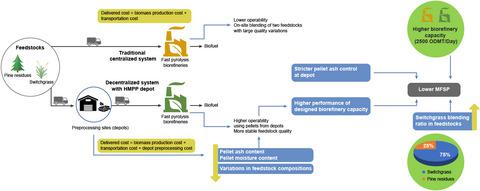当前位置:
X-MOL 学术
›
GCB Bioenergy
›
论文详情
Our official English website, www.x-mol.net, welcomes your
feedback! (Note: you will need to create a separate account there.)
Impacts of uncertain feedstock quality on the economic feasibility of fast pyrolysis biorefineries with blended feedstocks and decentralized preprocessing sites in the Southeastern United States
Global Change Biology Bioenergy ( IF 5.9 ) Pub Date : 2020-09-09 , DOI: 10.1111/gcbb.12752 Kai Lan 1 , Sunkyu Park 1 , Stephen S. Kelley 1 , Burton C. English 2 , Tun‐Hsiang E. Yu 2 , James Larson 2 , Yuan Yao 3
Global Change Biology Bioenergy ( IF 5.9 ) Pub Date : 2020-09-09 , DOI: 10.1111/gcbb.12752 Kai Lan 1 , Sunkyu Park 1 , Stephen S. Kelley 1 , Burton C. English 2 , Tun‐Hsiang E. Yu 2 , James Larson 2 , Yuan Yao 3
Affiliation

|
This study performs techno‐economic analysis and Monte Carlo simulations (MCS) to explore the effects that variations in biomass feedstock quality have on the economic feasibility of fast pyrolysis biorefineries using decentralized preprocessing sites (i.e., depots that produce pellets). Two biomass resources in the Southeastern United States, that is, pine residues and switchgrass, were examined as feedstocks. A scenario analysis was conducted for an array of different combinations, including different pellet ash control levels, feedstock blending ratios, different biorefinery capacities, and different biorefinery on‐stream capacities, followed by a comparison with the traditional centralized system. MCS results show that, with depot preprocessing, variations in the feedstock moisture and feedstock ash content can be significantly reduced compared with a traditional centralized system. For a biorefinery operating at 100% of its designed capacity, the minimum fuel selling price (MFSP) of the decentralized system is $3.97–$4.39 per gallon gasoline equivalent (GGE) based on the mean value across all scenarios, whereas the mean MFSP for the traditional centralized system was $3.79–$4.12/GGE. To understand the potential benefits of highly flowable pellets in decreasing biorefinery downtime due to feedstock handling and plugging problems, this study also compares the MFSP of the decentralized system at 90% of its designed capacity with a traditional system at 80%. The analysis illustrates that using low ash pellets mixed with switchgrass and pine residues generates a more competitive MFSP. Specifically, for a biorefinery designed for 2,000 oven dry metric ton per day, running a blended pellet made from 75% switchgrass and 25% pine residues with 2% ash level, and operating at 90% of designed capacity could make an MFSP between $4.49 and $4.71/GGE. In contrast, a traditional centralized biorefinery operating at 80% of designed capacity marks an MFSP between $4.72 and $5.28.
中文翻译:

原料质量的不确定性对美国东南部混合原料和分散预处理现场快速热解生物精炼厂经济可行性的影响
这项研究进行了技术经济分析和蒙特卡洛模拟(MCS),以探索生物质原料质量变化对使用分散预处理站点(即生产颗粒的仓库)快速热解生物精炼厂的经济可行性的影响。检查了美国东南部的两种生物质资源,即松木残留物和柳枝switch作为原料。针对一系列不同的组合进行了情景分析,包括不同的颗粒灰控制水平,原料混合比,不同的生物精炼能力和不同的生物精制生产能力,然后与传统的集中式系统进行了比较。MCS结果表明,通过仓库预处理,与传统的集中式系统相比,可以显着降低原料水分和原料灰分的变化。对于以其设计产能的100%运行的生物精炼厂,根据所有方案的平均值,分散系统的最低燃料销售价格(MFSP)为每加仑汽油当量(GGE)3.97美元至4.39美元,而对于传统的集中式系统价格为3.79-4.12美元/ GGE。为了了解高流动性粒料在减少由于原料处理和堵塞问题而导致的生物精炼厂停机时间方面的潜在好处,本研究还比较了分散系统的MFSP(其设计能力的90%)与传统系统(80%)的设计能力。分析表明,将低灰分颗粒与柳枝and和松树残留物混合使用会产生更具竞争力的MFSP。具体来说,对于一个设计为每天干燥2000吨的生物精炼厂,运行由75%柳枝and和25%松树渣(灰分含量为2%)制成的混合颗粒,并以设计容量的90%运行,可使MFSP介于$ 4.49和$ 4.71 / GGE。相比之下,以设计产能的80%运行的传统集中式生物精炼厂的MFSP在$ 4.72至$ 5.28之间。
更新日期:2020-10-15
中文翻译:

原料质量的不确定性对美国东南部混合原料和分散预处理现场快速热解生物精炼厂经济可行性的影响
这项研究进行了技术经济分析和蒙特卡洛模拟(MCS),以探索生物质原料质量变化对使用分散预处理站点(即生产颗粒的仓库)快速热解生物精炼厂的经济可行性的影响。检查了美国东南部的两种生物质资源,即松木残留物和柳枝switch作为原料。针对一系列不同的组合进行了情景分析,包括不同的颗粒灰控制水平,原料混合比,不同的生物精炼能力和不同的生物精制生产能力,然后与传统的集中式系统进行了比较。MCS结果表明,通过仓库预处理,与传统的集中式系统相比,可以显着降低原料水分和原料灰分的变化。对于以其设计产能的100%运行的生物精炼厂,根据所有方案的平均值,分散系统的最低燃料销售价格(MFSP)为每加仑汽油当量(GGE)3.97美元至4.39美元,而对于传统的集中式系统价格为3.79-4.12美元/ GGE。为了了解高流动性粒料在减少由于原料处理和堵塞问题而导致的生物精炼厂停机时间方面的潜在好处,本研究还比较了分散系统的MFSP(其设计能力的90%)与传统系统(80%)的设计能力。分析表明,将低灰分颗粒与柳枝and和松树残留物混合使用会产生更具竞争力的MFSP。具体来说,对于一个设计为每天干燥2000吨的生物精炼厂,运行由75%柳枝and和25%松树渣(灰分含量为2%)制成的混合颗粒,并以设计容量的90%运行,可使MFSP介于$ 4.49和$ 4.71 / GGE。相比之下,以设计产能的80%运行的传统集中式生物精炼厂的MFSP在$ 4.72至$ 5.28之间。











































 京公网安备 11010802027423号
京公网安备 11010802027423号